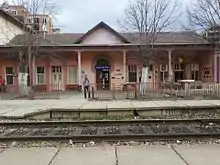Pristina railway station
Pristina railway station (Albanian: Stacioni i trenit në Prishtinë, Serbian: Приштинска железничка станица / Prištinska železnička stanica) is the central railway station in the city of Pristina, the capital of Kosovo. It opened on Tirana Boulevard (formerly 'Omladinskih Brigada') in 1936, having been constructed by a French/British company.[1] Trains calling at the station are operated by Trainkos sh.a.
 The station frontage in 2009 | |
| Location | Tirana Boulevard Pristina Kosovo[lower-alpha 1] |
| Coordinates | 42.658934°N 21.151067°E |
| Platforms | 2 |
| Tracks | 2 |
| History | |
| Opened | 1936 |

The line on which the station sits is single-track, laid to standard gauge, but there is a loop at the station, allowing trains to pass there, with a second, parallel, loop lying out-of-use as of October 2016.
A daily international train runs between Pristina and Skopje (Shkup), in North Macedonia.
Pristina is also served by the larger Kosovo Polje railway station at nearby Fushë Kosovë.
Events
During the era when Kosovo was part of the Socialist Federal Republic of Yugoslavia, the country's leader Marshall Tito occasionally visited Pristina, arriving on his personal Blue Train.[1]
During the 1999 Kosovo War, Serbian and Yugoslav regular forces, in conjunction with paramilitaries, conducted large-scale ethnic cleansing of ethnic Albanian inhabitants of Pristina through the station. Many of those expelled were directed onto trains apparently brought there for the express purpose of deporting them to the Macedonian border, where they were forced into exile.[2]
The station was restored by British soldiers, serving as part of KFOR, later in 1999.[3]
Notes
- Kosovo is the subject of a territorial dispute between the Republic of Kosovo and the Republic of Serbia. The Republic of Kosovo unilaterally declared independence on 17 February 2008. Serbia continues to claim it as part of its own sovereign territory. The two governments began to normalise relations in 2013, as part of the 2013 Brussels Agreement. Kosovo is currently recognized as an independent state by 98 out of the 193 United Nations member states. In total, 113 UN member states recognized Kosovo at some point, of which 15 later withdrew their recognition.
References
| Wikimedia Commons has media related to Pristina train station. |
- A'Mula, Shega (16 February 2009). "All Aboard! :: Balkan Insight". Balkan Insight. Retrieved 27 October 2016.
- "Kosovo Albanians 'driven into history'". BBC. April 1, 1999. Retrieved February 1, 2013.
- Marcus, Jonathan (17 July 1999). "The Kosovo Express". BBC Online. Retrieved 27 October 2016.